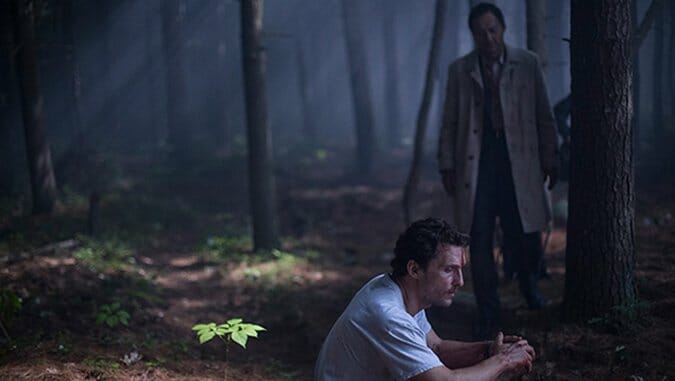
With The Sea of Trees, filmmaker Gus Van Sant returns to the inspirational (mainstream) tenor of movies like Good Will Hunting and Finding Forrester. Which is a shame considering that, on paper, this drama about two men wandering through Japan’s so-called “suicide forest” feels more akin to the poetic, introspective tone of 2002’s superb Gerry. Alas, the two sides of Van Sant’s creative personality don’t mesh well in this honorable, manipulative misfire. There’s nothing wrong with sappiness, just so long as it’s done a little more smartly than this.
Matthew McConaughey stars as Arthur, a Massachusetts math professor who has traveled one-way to Japan, parking his rental car outside Aokigahara, a dense forest nearby Mount Fuji. Every year, thousands of people kill themselves in these woods—so many, in fact, that as Arthur walks into the forest, he sees signs advocating that people with suicidal thoughts consider their friends and family before taking their life.
For reasons we don’t know yet, Arthur has chosen this spot for his own suicide. But just as he’s found a quiet spot and pulled out the pills he’s going to ingest to kill himself, he notices another man, Takumi (Ken Watanabe), wandering through the woods with blood covering his arms and chest. Arthur stops Takumi to see if he needs assistance—it turns out that the man is lost and can’t find the main path back to the parking lot. Arthur offers to help, but soon they realize they’re both lost. At the same time, Arthur is suspicious of Takumi’s protestations that he didn’t come into Aokigahara to off himself. As they try to find the way out, they begin to talk.
From that setup, we recall a similar opening to Gerry: Two buddies wander through the desert, get lost and fall into an almost metaphysical journey to find their way back to civilization. But The Sea of Trees inserts a more user-friendly element, employing multiple flashbacks to illustrate what brought Arthur to this fateful moment. Like clockwork, we see periodic snippets of his marriage to Joan (Naomi Watts), an ambitious realtor who in recent years has become a heavy drinker and a constant critic of what she perceives to be Arthur’s lack of career ambition. Because present-day Arthur is so distraught, we assume that something cataclysmic happened between Joan and him. But we’re not sure what, and so we have to wait for the flashbacks to slowly bring us up to speed.
Simultaneously, the two men try to find a way out of the woods, which is hard enough without screenwriter Chris Sparling throwing in gimmicky obstacles like a flash flood and a slippery rock that causes one of the characters to fall down a perilous chasm. But the challenges aren’t just physical: Arthur and Takumi will bond over their suicidal thoughts, with Takumi assuming the role of the man who believes in God and an afterlife, while Arthur (the mathematician) serves as the devout nonbeliever.
Van Sant manages to create some drama inside the woods, making the characters’ predicament seem like some sort of spiritual purgatory. But the fundamental problem with The Sea of Trees is that the present-day material is merely connective tissue so that we can get to the real drama, which is finding out what happened with Arthur and Joan. Unfortunately, there’s not a lot of insight there, either: This flailing couple have their problems, but they’re not unique or universal enough to really resonate.
It’s not from a lack of trying on McConaughey and Watts’ parts. They ably convey the torn connection between a husband and wife—naturally, there are dark secrets that will get dredged up—with just the right balance of aggravation, hopelessness and resilient affection. But this type of narrative can’t help but feel like one long tease after a while: It’s merely a matter of time until the big reveal occurs, but we have to sit through a series of coy flashbacks until we get to it.
By comparison, McConaughey and Watanabe lack a similar rapport. A large part of the difficulty comes from the fact that the filmmakers haven’t really conceived Takumi to be anything more than a sounding board for Arthur’s coiled-up misery. We hear little about his backstory, and the inequality between the two characters (on a script level) starts to become actively aggravating, as if Arthur’s pain is inherently more important than Takumi’s.
Beyond the big reveal of Arthur’s past trauma, however, The Sea of Trees has another twist it wants to lay on us near the end. It’s impossible to discuss the twist without spoiling the entire film, so let it be said that Van Sant deserves partial credit for being willing to go for something so sentimental and brazenly magical in his final flourish. But such a gambit only works if it feels earned, and The Sea of Trees cheats enough in its execution to leave its third-act surprise feeling manipulative—to say nothing of implausible.
When Van Sant made Gerry 13 years ago, it began a period in which he focused on experimental, micro-budget films that dealt with death: Elephant, Last Days and Paranoid Park soon followed. The Sea of Trees could be looked at as a more accessible addition to that slate. And it’s easily the weakest—not just because it’s the only one that makes death seem so phony.
Director: Gus Van Sant
Writer: Chris Sparling
Starring: Matthew McConaughey, Ken Watanabe, Naomi Watts
Release Date: Screening in Competition at the 2015 Cannes Film Festival
Tim Grierson is chief film critic for Paste and the vice president of the Los Angeles Film Critics Association. You can follow him on Twitter.